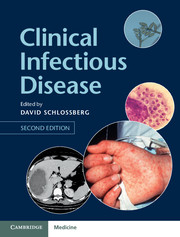Book contents
- Frontmatter
- Dedication
- Contents
- List of Contributors
- Preface
- Part I Clinical syndromes: general
- Part II Clinical syndromes: head and neck
- Part III Clinical syndromes: eye
- Part IV Clinical syndromes: skin and lymph nodes
- Part V Clinical syndromes: respiratory tract
- Part VI Clinical syndromes: heart and blood vessels
- Part VII Clinical syndromes: gastrointestinal tract, liver, and abdomen
- Part VIII Clinical syndromes: genitourinary tract
- Part IX Clinical syndromes: musculoskeletal system
- Part X Clinical syndromes: neurologic system
- Part XI The susceptible host
- 84 Evaluation of suspected immunodeficiency
- 85 Infections in the neutropenic patient
- 86 Infections in patients with neoplastic disease
- 87 Corticosteroids, cytotoxic agents, and infection
- 88 Biologics
- 89 Infections in transplant recipients
- 90 Diabetes and infection
- 91 Infectious complications in the injection and non-injection drug user
- 92 Infections in the alcoholic
- 93 Infections in the elderly
- 94 Neonatal infection
- 95 Pregnancy and the puerperium: infectious risks
- 96 Dialysis-related infection
- 97 Overwhelming postsplenectomy infection
- Part XII HIV
- Part XIII Nosocomial infection
- Part XIV Infections related to surgery and trauma
- Part XV Prevention of infection
- Part XVI Travel and recreation
- Part XVII Bioterrorism
- Part XVIII Specific organisms: bacteria
- Part XIX Specific organisms: spirochetes
- Part XX Specific organisms: Mycoplasma and Chlamydia
- Part XXI Specific organisms: Rickettsia, Ehrlichia, and Anaplasma
- Part XXII Specific organisms: fungi
- Part XXIII Specific organisms: viruses
- Part XXIV Specific organisms: parasites
- Part XXV Antimicrobial therapy: general considerations
- Index
- References
88 - Biologics
from Part XI - The susceptible host
Published online by Cambridge University Press: 05 April 2015
- Frontmatter
- Dedication
- Contents
- List of Contributors
- Preface
- Part I Clinical syndromes: general
- Part II Clinical syndromes: head and neck
- Part III Clinical syndromes: eye
- Part IV Clinical syndromes: skin and lymph nodes
- Part V Clinical syndromes: respiratory tract
- Part VI Clinical syndromes: heart and blood vessels
- Part VII Clinical syndromes: gastrointestinal tract, liver, and abdomen
- Part VIII Clinical syndromes: genitourinary tract
- Part IX Clinical syndromes: musculoskeletal system
- Part X Clinical syndromes: neurologic system
- Part XI The susceptible host
- 84 Evaluation of suspected immunodeficiency
- 85 Infections in the neutropenic patient
- 86 Infections in patients with neoplastic disease
- 87 Corticosteroids, cytotoxic agents, and infection
- 88 Biologics
- 89 Infections in transplant recipients
- 90 Diabetes and infection
- 91 Infectious complications in the injection and non-injection drug user
- 92 Infections in the alcoholic
- 93 Infections in the elderly
- 94 Neonatal infection
- 95 Pregnancy and the puerperium: infectious risks
- 96 Dialysis-related infection
- 97 Overwhelming postsplenectomy infection
- Part XII HIV
- Part XIII Nosocomial infection
- Part XIV Infections related to surgery and trauma
- Part XV Prevention of infection
- Part XVI Travel and recreation
- Part XVII Bioterrorism
- Part XVIII Specific organisms: bacteria
- Part XIX Specific organisms: spirochetes
- Part XX Specific organisms: Mycoplasma and Chlamydia
- Part XXI Specific organisms: Rickettsia, Ehrlichia, and Anaplasma
- Part XXII Specific organisms: fungi
- Part XXIII Specific organisms: viruses
- Part XXIV Specific organisms: parasites
- Part XXV Antimicrobial therapy: general considerations
- Index
- References
Summary
Introduction
Biologic therapies have revolutionized nearly every discipline of medicine. As our understanding of the relevant immunologic pathways of cancer, rheumatologic disease, hematopoietic and solid organ transplantation has evolved, so has the discovery of new monoclonal antibodies for targeted therapy. Currently, over 100 monoclonal antibodies have been approved for clinical use. This chapter highlights two commonly used monoclonal antibodies and their associated infectious complications. We outline the immunologic mechanism of action and indications of use of these important biologic therapies. We also examine the commonly reported infectious complications and summarize the role for pre-implementation diagnostics, post-implementation surveillance, and antimicrobial prophylaxis.
Lymphocyte-depleting therapies
Monoclonal antibodies that target surface proteins found on lymphocytes including alemtuzumab (humanized chimeric monoclonal antibody that recognizes CD52) and rituximab (chimeric murine/human monoclonal antibody directed against the CD20) have been used successfully in the management of lymphoproliferative disorders and autoimmune diseases. We focus on rituximab because of the propensity of available data. Rituximab is constructed with human IgG1 and kappa-chain constant regions and heavy and light chain variable regions from a murine antibody to the CD20 antigen, a hydrophobic transmembrane protein which is present on mature B lymphocytes but absent from the surface of normal plasma cells. Rituximab eliminates mature B cells. Although the CD20 antigen is absent from the surface of mature plasma cells, rituximab can be complicated by hypogammaglobulinemia; the precise mechanism is incompletely understood. Rituximab is currently approved for the treatment of non-Hodgkin's lymphoma (NHL), follicular lymphoma (FL), diffuse large B-cell lymphoma (DLBCL), chronic lymphocytic leukemia (CLL), and antineutrophil cytoplasmic antibody (ANCA)-associated vasculitides. In addition, rituximab is approved as second-line therapy for rheumatoid arthritis (RA) not responsive to tumor necrosis factor (TNF)-blocking agents. This anti-CD20 monoclonal antibody has also been widely used off-label for lupus, autoimmune hematologic diseases (including primary idiopathic thrombocytopenic purpura and autoimmune hemolytic anemia), multiple sclerosis, bullous dermatologic disorders, immune-mediated glomerular disease, and cryoglobulinemia.
- Type
- Chapter
- Information
- Clinical Infectious Disease , pp. 567 - 572Publisher: Cambridge University PressPrint publication year: 2015
References
- 1
- Cited by



